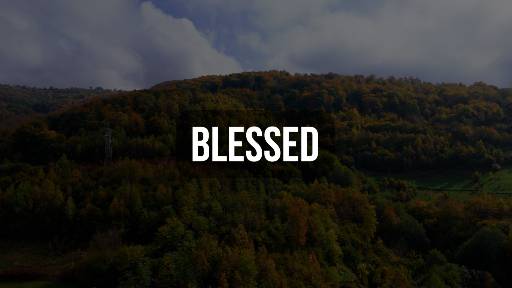-
Psalm 136 (Kjv) Title: His Loving Kindness Endures Forever Series
Contributed by John Lowe on Jun 26, 2020 (message contributor)
Summary: The theme of this psalm isT “mercy’s vast unfathomable sea.” God’s love is deeper, far deeper than that. The psalmist looks first at God’s goodness manifested in His “mercy.” The word for mercy is the usual word for grace or lovingkindness. That “mercy endures forever.”
3/25/20
Tom Lowe
Psalm 136 (KJV)
1O give thanks unto the LORD; for he is good: for his mercy endureth forever.
2O give thanks unto the God of gods: for his mercy endureth forever.
3O give thanks to the Lord of lords: for his mercy endureth for ever.
4To him who alone doeth great wonders: for his mercy endureth forever.
5To him that by wisdom made the heavens: for his mercy endureth forever.
6To him that stretched out the earth above the waters: for his mercy endureth forever.
7To him that made great lights: for his mercy endureth for ever:
8The sun to rule by day: for his mercy endureth for ever:
9The moon and stars to rule by night: for his mercy endureth forever.
10To him that smote Egypt in their firstborn: for his mercy endureth for ever:
11And brought out Israel from among them: for his mercy endureth for ever:
12With a strong hand, and with a stretched out arm: for his mercy endureth forever.
13To him which divided the Red sea into parts: for his mercy endureth for ever:
14And made Israel to pass through the midst of it: for his mercy endureth for ever:
15But overthrew Pharaoh and his host in the Red sea: for his mercy endureth forever.
17To him which smote great kings: for his mercy endureth for ever:
18And slew famous kings: for his mercy endureth for ever:
19Sihon king of the Amorites: for his mercy endureth for ever:
20And Og the king of Bashan: for his mercy endureth for ever:
21And gave their land for an heritage: for his mercy endureth for ever:
22Even an heritage unto Israel his servant: for his mercy endureth forever.
23Who remembered us in our low estate: for his mercy endureth for ever:
24And hath redeemed us from our enemies: for his mercy endureth forever.
25Who giveth food to all flesh: for his mercy endureth forever.
26O give thanks unto the God of heaven: for his mercy endureth forever.
Background
This psalm was probably written by Hezekiah after the Captivity; it goes over parts of Israel’s history and underlines the wisdom of worshipping the true God, the God whose “mercy endureth forever.” That expression occurs like a chorus in every verse and that is what sets it apart from all other psalms in the Psalter.
Two choirs sang this psalm. One choir sang the first line of every verse, and the other choir answered, “his mercy endureth forever.” This was not vain repetition (Matt. 6:7), for the second choir was offering inspired praise to the Lord. You can never say too much about the mercy of God!
In the Rabbinical writings, Psalm 136 was designated as “the Great Hallel,” but it has no title in the Hebrew, nor any of the versions and the author and occasion are unknown. It is little else than a repetition of the preceding psalm with an adage added: “for his mercy endureth forever.” Every verse ends with the same expression.
Commentary
(1-3) The call to thanksgiving.
1. O give thanks unto the LORD; for he is good: for his mercy endureth for ever.
The theme of this psalm isT “mercy’s vast unfathomable sea.” God’s love is deeper, far deeper than that. The psalmist looks first at God’s goodness manifested in His “mercy.” The word for mercy is the usual word for grace or lovingkindness. That “mercy endures forever.” he psalm begins with the call to thanksgiving— O give thanks unto the LORD. The opening verses give a three-fold invitation to join in thanking God for His goodness and mercy. It is addressed by the leader or choir to the congregation.
“Give thanks” means “to give a public acknowledgment
“Mercy,” which may also be translated “loyal love,” is the most significant term used in the Psalms to describe the character of God. His mercy is “forever”; it is part of His eternal character. Now, let me expand on the meaning of the word “mercy.” By “mercy” we understand the Lord’s disposition to save those who sin has rendered miserable and vile, and all the provision He has made for the redemption of sinners by Jesus Christ. The counsels [advice; guidance] of this mercy has been from everlasting, and the effects of it will endure forever, to all who are interested in it. The Lord continues equally ready to show mercy for all who seek after it, and this is the source of all our hope and comfort.
2. O give thanks unto the God of gods: for his mercy endureth forever.
God is merciful because He is God. It is His nature as God to be merciful. When Moses in his memories sought to explain to Israel why God set His heart’s affections on them. He said, “The LORD did not set his love upon you, nor choose you, because ye were more in number than any people; But because the LORD loved you, and because he would keep the oath which he had sworn unto your fathers, hath the LORD brought you out with a mighty hand, and redeemed you out of the house of bondmen, from the hand of Pharaoh king of Egypt.

 Sermon Central
Sermon Central

